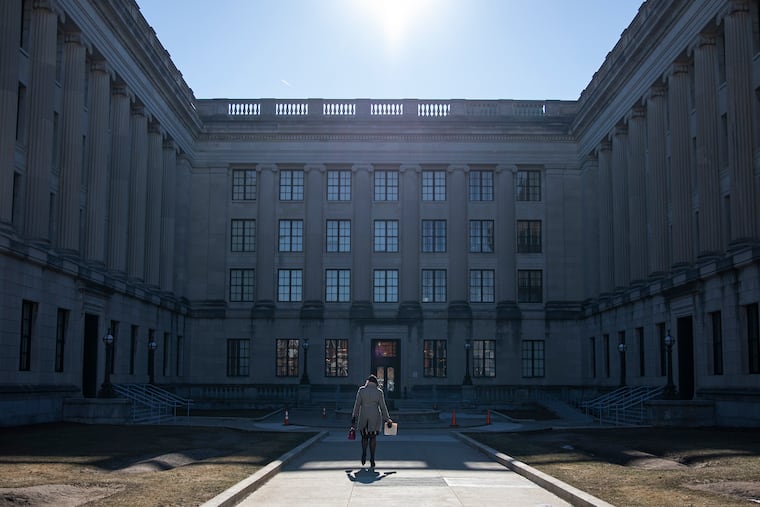Lack of oversight in New Jersey’s addiction treatment industry is leading to corruption, a sweeping report finds
"Fraud, unethical conduct and wrongdoing were found in businesses at every stage of the recovery process," investigators wrote.

New Jersey’s addiction treatment industry is plagued with corruption that leads to poor treatment of patients — in part because the state’s laws do not adequately prevent wrongdoing in the industry, a wide-ranging report from the state Commission of Investigation found.
The report, released Tuesday, highlighted questionable practices at several treatment facilities and sober living houses that the state has been investigating for years, including some in the Philadelphia region.
They included allegations of “patient brokering,” an illegal practice that occurs when someone accepts a payment to refer a patient to a specific addiction treatment center. Investigators also found instances of tax evasion and fraud from addiction treatment center owners and raised concerns about false marketing that could lead desperate patients to seek treatment at subpar facilities.
“Fraud, unethical conduct and wrongdoing were found in businesses at every stage of the recovery process, sometimes starting as early as an overdose victim’s first encounter with an addiction professional at their hospital bedside or during an online search for treatment,” investigators wrote.
Alleged ‘patient brokering’
Investigators identified several peer recovery coaches — people who themselves struggled with addiction who now help other patients navigate the treatment system — who had accepted money from specific treatment centers to send patients their way.
One example of such “patient brokering” involved a recovery coach from Toms River, described in the report as a “rising star” in the addiction treatment community, who was paid more than half a million dollars over the course of a year to refer patients to nearly 20 treatment programs in the area, investigators said.
The coach, Joe Brogan, partnered with the Monmouth County Sheriff’s Department in 2017 to place incarcerated people in treatment programs, though he signed no contract with the department, the report said.
At the same time, an outpatient addiction treatment center in West Chester paid Brogan nearly $266,000 over six months to send to their facility inmates from Monmouth County with private insurance plans that could pay more for treatment, investigators said.
The center and Brogan ended their arrangement after he sent only one patient their way. The treatment center was not identified in the report and is now closed.
Victor Iannello, the warden at Monmouth County Correctional Institution, said that the jail ended its relationship with Brogan because his services offered treatments out of state.
“The goal of recovery is to provide a secure path to a healthy lifestyle and reduce the rate of recidivism. Mr. Brogan’s services did not do that at MCCI, since the program offered out-of-state treatment, resulting in its termination,” Iannello said in a statement.
Brogan died of an overdose in a Philadelphia hotel room in 2020.
Brogan was not the only person referring patients to treatment centers who also worked closely with the centers themselves, the report said. In Mercer County, which includes the state capital of Trenton, most recovery coaches working for the county Council on Alcoholism and Drug Addiction under a state grant designed to prevent overdoses were also working for either a treatment center or a nonprofit funded by treatment centers.
“No specific evidence of brokering was uncovered; however, the employment of recovery coaches at treatment centers and entities funded by treatment centers has the potential for abuse,” investigators wrote.
Mercer County officials did not immediately return a request for comment.
Treatment centers and sober homes
The report also highlighted wrongdoing at several treatment centers with local connections, including the Mullica Hill addiction treatment facility Kingsway Recovery. Investigators said the company had overbilled insurers and funneled money to Graceway, a sober home operation owned by Michelle DeSimone — the wife of Nicholas DeSimone, who ran Kingsway.
Investigators said that Kingsway and Graceway worked in tandem to make money off of vulnerable patients, encouraging them to stay at Graceway sober homes in order to get treatment at Kingsway.
In a response letter published with the report, Nicholas DeSimone denied the allegations, saying that he did not overbill insurers and that his addiction treatment center did not always send its patients to stay at his wife’s sober homes.
In a statement issued Wednesday, DeSimone said that though he disagreed with some of the report, he appreciated the commission for investigating the state’s rehab industry. “In founding Kingsway, I had the same goal in mind: ensure those in Kingsway’s care receive the very best treatment to obtain the main goal — long-term or lifetime recovery,” he said.
The report said that investigators found a number of sober living homes in New Jersey with “undisclosed financial ties” to treatment centers. This isn’t specifically banned under state law, investigators said, but treatment centers must note such relationships when they’re seeking approval to operate in the state. Many treatment facilities, the report noted, did not do so — and in some cases actively sought to hide their ties to sober homes.
Recommending reforms
Changes recommended to counteract the problems laid out in the 106-page report include a wider ban on patient brokering practices, stricter state oversight of treatment centers and sober living houses, and harsher punishment for misleading advertising of treatment services.
The state’s patient brokering laws, currently applying to individuals, should be broadened to health care, nonprofit organizations and sober homes. And the practice should carry fines up to $50,000, instead of the current maximum fine of $10,000. A patient brokering conviction is currently also punishable with a year and a half in prison.
The report also recommended that the state itself should issue licenses for recovery coaches; currently, a private nonprofit issues only certifications for such positions.
The state should also launch a task force to decide whether a single entity — instead of the numerous organizations that oversee different aspects of addiction treatment — should regulate the industry as a whole in New Jersey, investigators said.